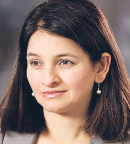IN AN UPDATE of a phase I trial, a heavily pretreated population of patients with multiple myeloma continued to respond to the chimeric antigen receptor (CAR) T-cell therapy bb2121.1 The results presented at the 2018 ASCO Annual Meeting confirmed previous findings for bb2121 in the dose-escalation cohort of the CRB-401 study. The U.S. Food and Drug Administration granted bb2121 Breakthrough Therapy designation in November 2017.
The bb2121 construct is the most mature CAR T-cell approach in development for myeloma. Its target is a common myeloma cell-surface protein known as B-cell maturation antigen (BCMA), which is associated with myeloma cell growth, survival, and proliferation.

Noopur Raje, MD
“We found that bb2121 at active doses induces deep and durable responses in a heavily pretreated population with relapsed or refractory multiple myeloma,” said Noopur Raje, MD, of Massachusetts General Hospital in Boston, in an update of CRB-401.
The CRB-401 trial included 43 patients in dose-escalation (n = 21) and dose-expansion (n = 22) cohorts, the latter being the focus of the update. Patients had received a median of 8 prior regimens (range, 3–23). One-third were penta-refractory, having progressed on lenalidomide (Revlimid), bortezomib, pomalidomide (Pomalyst), daratumumab (Darzalex), and carfilzomib (Kyprolis), and almost all had received a stem cell transplant. Patients received various doses of CAR T cells (50, 150, 450, or 800 million cells) after undergoing lymphodepletion with fludarabine and cyclophosphamide. The dose-escalation analysis showed that at least 150 × 106 (150 million) CAR T cells would be needed to achieve optimal outcomes.
Deep Response, Prolonged Progression-Free Survival
DESPITE THE disease refractoriness of the population, the overall response rate to CAR T-cell therapy was 95.5% among patients treated with > 150 million cells, 57.1% among patients receiving 150 million cells, and 33.3% among those treated with the lowest dose, 50 million cells. For the highest-dose cohort, the median duration of response was 10.8 months, compared to 1.9 months for the lowest-dose cohort, Dr. Raje reported.
CAR T-CELL THERAPY WITH bb2121 IN MYELOMA
- In an update of the phase I CRB-401 trial of bb2121 CAR T-cell therapy in 43 heavily pretreated myeloma patients, responses were achieved by 95.5% of those receiving the optimal dose of > 150 million cells.
- Patients given the “active” dose of at least 150 million cells had a median progression-free survival of 11.8 months.
- Responders who became MRD-negative had a median progression-free survival of 17.7 months.
- Cytokine-release syndrome occurred in 63% of patients and was mostly mild and manageable.
The investigators also analyzed outcomes for patients receiving the “active dose” of at least 150 million cells. In this group, median progression-free survival was 11.8 months, compared to 2.7 months for those treated with the “inactive dose” of 50 million cells. Among the 16 dose-expansion patients who responded and who also achieved minimal residual disease (MRD) negativity, median progression-free survival was 17.7 months, she said.
A median progression-free survival of a year and a half in respondents was encouraging in such a refractory population. Still, some CAR T-cell “watchers” were disappointed, hoping that this apparently potent therapy might have presumably cured these patients.
The treatment was considered safe, but 63% of patients did experience cytokine-release syndrome. The majority of cases were mild to moderate; 5% were grade ≥ 3, which resolved within 24 hours, and the 1 grade ≥ 4 event was reversible. Most patients developing cytokine-release syndrome (81%) had received > 150 million cells.
“Cytokine-release syndrome was mostly low-grade and manageable in this study, and we used tocilizumab [Actemra] and corticosteroids infrequently,” Dr. Raje said. In addition, 33% of patients experienced neurotoxicity, 81% developed neutropenia, 61% had thrombocytopenia, and 56% had anemia. “To date, the safety profile of bb2121 has been manageable at doses as high as 800 million CAR T cells,” she said.
A phase II international clinical trial of bb2121 known as KarMMa is currently underway, with a planned enrollment of approximately 100 patients. Additional trials in earlier lines of treatment are also planned. Another CAR T-cell therapy being developed in myeloma, JNJ-68284528, also targets BCMA. In a study presented at the 2017 ASCO Annual Meeting, the response rate to this product was 100%.2 A phase I/IIb clinical trial of JNJ- 68284528 is slated to start later this year. ■
DISCLOSURE: Dr. Raje has been a consultant and/or advisor for Amgen, Bristol-Myers Squibb, Celgene, Merck, Novartis, and Takeda.
REFERENCES
1. Raje NS, et al: bb2121 anti-BCMA CAR T-cell therapy in patients with relapsed/refractory multiple myeloma: Updated results from a multicenter phase I study. 2018 ASCO Annual Meeting. Abstract 8007. Presented June 1, 2018.
2. Fan F, et al: Durable remissions with BCMA specific chimeric antigen receptor-modified T cells in patients with refractory/relapsed multiple myeloma. 2017 ASCO Annual Meeting. Abstract LBA3001. Presented June 5, 2017.


